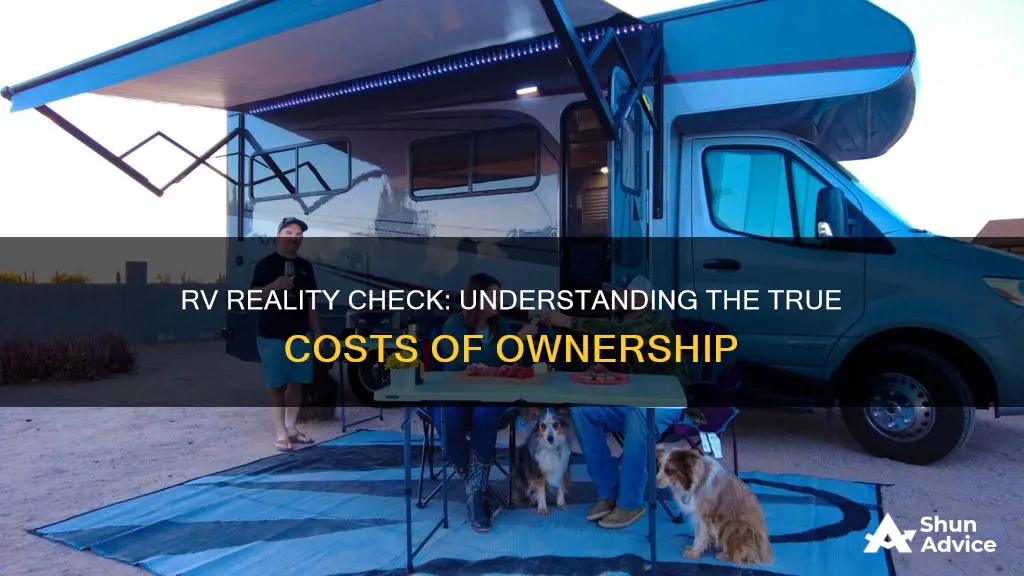
There are many factors to consider when deciding whether to invest in an RV. On the one hand, RVs offer flexibility, convenience, and the ability to bring your own amenities and pets. They can also save you money on vacation, especially if you travel frequently or with a large family. Additionally, owning an RV gives you more freedom to travel wherever and whenever you want. However, there are also drawbacks to consider. RVs are expensive to buy and maintain, and they may not be a good investment if you're simply looking to sell for a profit. Other downsides include the physical demands of owning an RV, the difficulty of driving and parking, and the challenge of finding storage. Ultimately, the decision to buy an RV depends on your personal goals, lifestyle, and financial situation.
| Characteristics | Values |
|---|---|
| Cost | RVs can be expensive to buy and maintain, with costs for maintenance, storage, fuel, accessories, insurance, and repairs. |
| Depreciation | RVs depreciate over time, with some sources stating a loss of 20-30% in the first year and over 35% after five years. |
| Lifestyle | RVs offer a nomadic lifestyle with convenience, customisation, and simplified travel. They are ideal for frequent travellers, full-time living, and those seeking an outdoor lifestyle. |
| Usage | RVs may not be used as frequently as intended due to work, family, and other commitments. Spontaneous travel is more challenging with an RV. |
| Alternatives | Renting an RV is a viable alternative to buying, offering flexibility, inclusivity, and lower costs for infrequent use. |
What You'll Learn

High upfront cost
The initial cost of an RV can be very high. A used RV can cost anywhere from $1,000 to over $700,000, while a new RV can cost from $14,000 to over $800,000. This is a significant expense, and for many people, it may not be a worthwhile investment.
In addition to the upfront cost of the RV itself, there are also a number of other costs associated with owning an RV. These include maintenance, storage, fuel, insurance, and registration fees. These ongoing costs can add up quickly and should be carefully considered before purchasing an RV.
For those who are interested in the RV lifestyle but are concerned about the high upfront cost, renting may be a more feasible option. Rental prices for small RVs or trailers can start at $100 to $200 per night, which could be a more affordable way to try out the RV lifestyle before committing to a purchase.
It's also worth noting that RVs depreciate in value over time, with some sources estimating a loss of 20-30% in the first year alone. This means that buying an RV is not a good investment strategy if you're looking to sell it for a profit. However, depreciation is a common factor for most personal vehicles, and for those who plan to use their RV frequently, the savings on rental fees and travel costs may outweigh the depreciation.
Overall, the high upfront cost of an RV is a significant factor to consider before purchasing. It's important to carefully weigh the benefits of owning an RV against the financial burden, as well as explore alternative options like renting, to make an informed decision.
The Market's Resilience: Will Investments Bounce Back?
You may want to see also

High maintenance
Owning an RV can be high maintenance. RVs require regular maintenance to keep them in good working order. If you don't, you may be in for a surprise the next time you use it.
RVs are put through extreme conditions, and the more you use them, the more likely you will experience an issue. To keep up with maintenance, you'll need to inspect practically every inch of your RV regularly. This includes checking the roof seals and seams for leaks every six months to prevent water damage, which can cost hundreds or thousands of dollars to repair. It's also important to keep your RV's awning clean and free of debris to prevent mildew and mould buildup, as well as nests and tears from debris.
You'll also need to maintain your RV's tires, brakes, batteries, wastewater system, slide-outs, oil, filters, and electrical connections. Many of these tasks are simple and can be completed by any RV owner, but some are more complex and may need to be left to professionals. For example, RV generators should be serviced according to the manufacturer's schedule, which can cost up to $9,000 in repairs if ignored.
The cost of maintenance should be considered when deciding whether to invest in an RV. While some maintenance tasks can be done yourself, others will require the help of a professional. It's important to budget for these costs and factor them into your decision.
Selecting Retirement Investments: Strategies for Long-Term Financial Security
You may want to see also

Lack of convenience
RVs can be a great investment for those seeking a nomadic lifestyle, enabling them to save on rental fees, hotels, and flights. However, they come with their own set of challenges and a lack of convenience. Here are some reasons why buying an RV may not be the most convenient option:
Maintenance and Repairs
Maintaining an RV is a tedious task that requires regular attention. You'll need to keep up with tasks such as oil changes, tire rotations, fluid checks, and winterizing and dewinterizing the vehicle. These maintenance tasks can be time-consuming and costly, especially if you don't have the necessary skills or knowledge. Additionally, RVs are prone to various issues, including plumbing problems, leaky roofs and windows, toilet issues, and electrical problems. These issues can be frustrating and may require frequent repairs, adding to the overall cost and inconvenience of owning an RV.
Storage and Parking Challenges
Storing an RV when it's not in use can be expensive and inconvenient. If you don't have a large property, you'll likely need to pay for storage, which can cost anywhere from $50 to $500 per month. Finding a suitable storage facility with the necessary features and amenities can be challenging, and you may have to compromise on location or incur additional expenses.
Driving and Maneuvering Difficulties
Driving and parking an RV can be a nerve-wracking experience, especially for first-time owners. The large size and weight of RVs make manoeuvring through narrow roads, low bridges, and tight parking spaces a challenging task. This lack of convenience can take away from the enjoyment of your travels and may require you to plan your routes carefully to avoid such obstacles.
Internet Connectivity Issues
If you're planning to work remotely while travelling in your RV, internet connectivity can be a significant concern. Reliable internet access in remote locations can be challenging, and you may find yourself struggling to stay connected. While there are options like Starlink, which offers promising results, it's important to research and plan for reliable internet access if you intend to work while on the road.
Time Commitment
Owning an RV requires a significant time investment. From regular maintenance and repairs to planning and packing for trips, the time commitment can be substantial. If you have a busy schedule or limited free time, the demands of RV ownership may become burdensome. It's important to consider whether you have the time and energy to dedicate to maintaining and using your RV regularly.
Monthly Cash Flow: Exploring Regular Investment Payouts
You may want to see also

Difficulty of resale
One of the most significant drawbacks of purchasing an RV is the difficulty of reselling it. While some sources suggest that RVs can be a good investment for those seeking a nomadic lifestyle or looking to save on rental fees, hotels, and flights, others argue that RVs are not a good investment if the sole purpose is to buy and sell for a profit.
RVs, like most personal vehicles, depreciate over time. According to Camper Report, RVs lose 21% of their value as soon as they're purchased and over 35% after five years. This depreciation can be a significant factor when trying to sell a used RV. While the mileage on an RV may not significantly impact its value, time certainly does. It is estimated that an RV loses 20% of its value by simply driving it off the dealership lot.
There are several factors that contribute to depreciation, including the class of the vehicle, maintenance, damage, external appearance, and brand recognition. External damages, such as dents, scratches, or dings, can lead to drastic depreciation. Maintaining the exterior of the RV is crucial, as any alterations, such as stickers or paint, can diminish its value.
In addition, proper maintenance and upkeep are essential to preserving the resale value of an RV. Regular oil changes, parts replacements, repairs, and tune-ups are necessary to ensure the vehicle is in good condition for resale. Water damage, whether from plumbing issues or inclement weather, can also cause significant depreciation if not addressed promptly.
Furthermore, the brand of the RV plays a role in its resale value. Well-known brands like Winnebago, Airstream, and Coachmen are more likely to retain their value due to their reputation and brand recognition.
When it comes to the interior of the RV, it is advisable to avoid any permanent alterations, such as painting the walls or installing new flooring. Potential buyers may not share the same taste, and these changes can be off-putting. It is also important to avoid using nails or screws that will result in holes in the walls. Instead, opt for removable alternatives like 3M Command Hooks.
In summary, while RVs can be a good investment for those seeking a nomadic lifestyle or looking to save on travel expenses, they are not ideal for those solely seeking to buy and sell for a profit. The difficulty of reselling an RV stems from the significant depreciation, external and internal alterations, maintenance records, brand recognition, and overall condition of the vehicle.
Investments: What's Cheap Now?
You may want to see also

Storage costs
On average, RV storage prices can range from as low as $50 a month to up to $500 a month. However, these rates can vary significantly. For example, in Altamonte Springs, Florida, the average cost for RV storage is $240 per month, while in Omaha, Nebraska, the average cost is $164 per month.
One of the main factors influencing storage costs is the type of storage you choose. Indoor storage tends to be the most expensive option, followed by covered storage, and then outdoor storage. Indoor storage provides complete protection from the elements and typically costs between $50 and $450 a month. Covered storage, which provides a roof but leaves the RV exposed on two or more sides, usually costs between $60 and $230 per month. Outdoor storage is the most affordable option and can range from $30 to $100 per month. However, outdoor storage leaves your RV exposed to the elements and may not offer adequate security.
The size of your RV will also impact storage costs. Larger RVs will require more space and, therefore, will generally be more expensive to store. Additionally, certain amenities, such as climate control, battery charging, and sewage dumping, can increase the monthly cost of storing your RV.
It's worth noting that storing your RV at your residence may be illegal in some areas, so it's important to check local regulations before assuming this is an option.
Investments: Spend, Save, or Grow?
You may want to see also
Frequently asked questions
An RV can be a good investment if you plan to live in it full-time or take frequent trips. It can help you save on rental fees, hotels, flights, and more. However, if you’re looking to invest in an asset to buy and then sell for a profit, an RV might not be the best option as it depreciates over time.
Some pros of buying an RV are that it can save you money, it feels like home, and it gives you more freedom than other types of travel. You can also bring your pets without paying extra, and you have the freedom to travel wherever you like at your own pace.
Some cons of buying an RV are that it can be expensive, you are responsible for all the costs, maintenance, and storage, and it can be difficult to find a campsite, especially if you want to travel spontaneously.
The cost of an RV can vary depending on the size and features, but they typically range from $1,000 to over $800,000 for a new one. Used RVs are generally cheaper, but even small RVs can have a hefty price tag.
Before buying an RV, consider how often you will use it, whether you have the budget and space for it, and whether you are comfortable with the maintenance and storage requirements. It is also a good idea to rent an RV first to make sure that the RV lifestyle is a good fit for you.







